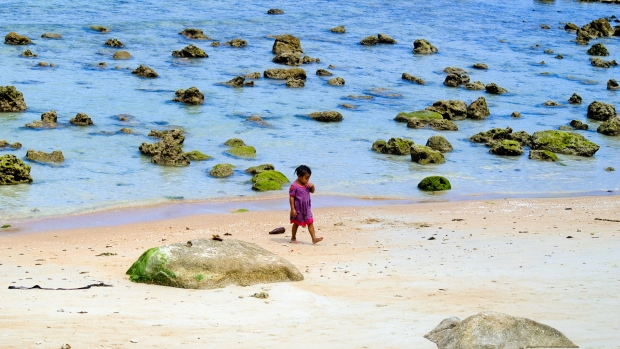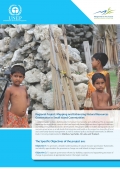Grants :: Regional Grant Facilities :: Mapping and enhancing natural resource governance in Small Island Communities
Mapping and enhancing natural resource governance in Small Island Communities

Koh Samui attracts high-end tourists; raises cost of living ... , Thailand © MFF
Objectives
The project aimed to enable and support natural resource governance on small islands that integrates and builds on the respective strengths of local and community-based management as well as national policy and legal frameworks at different levels, with the following specific objectives:
1. To generate a detailed understanding of natural resource governance frameworks, including local and community-based management practices, on small islands in the target countries, identifying how decisions affecting natural resources and ecosystem services are made as well as gaps and complementarities between the “formal” and “informal” governance frameworks;
2. To support governance reforms and ongoing processes of decentralization by identifying opportunities for governance change that reconciles overlaps, overcomes gaps, and harnesses the capacity and comparative advantage of different actors;
3. To build capacity among key stakeholder groups for natural resource governance and governance reform, with a primary focus on local communities and local government institutions/administration.
Background
The project aided in filling a critical knowledge gap regarding how governance systems operate in small island environments, and contributed to better utilization of the respective strengths of different stakeholders in natural resource governance. In doing so it supported ongoing efforts to decentralize environmental management and enhance public participation in decision-making. This project enhanced prospects for sustainable and inclusive natural resource governance in island countries and countries with small islands by identifying and understanding island-specific challenges and constraints, and addressing these through targeted interventions.
The project mapped governance mandates, institutions, stakeholders and practices, from national to local level, identifying gaps and needs. Findings were published in review reports on natural resource governance frameworks, decision processes and community involvement practices. Recommendations for governance reform have been developed, including identification of opportunities and synthesis of available approaches and tools. A draft resource toolkit for community involvement in natural resource governance in small islands has been developed, targeted primarily at communities, community groups and local organizations as well as local government.
The resource toolkit provides a framework for integration of community stakeholders and practices into local and provincial planning/decision making. Capacity building interventions include targeted training among key stakeholder groups, notably communities and local government and/or pilot-scale demonstration interventions for small island natural resource governance reform. The project provides a foundation on which further interventions, including through MFF small and medium sized grants, can be implemented.
Target beneficiaries
Stakeholders in Maldives, Seychelles, Sri Lanka, and Thailand.
Outputs
The project aimed to deliver the following outputs:
1. Review reports on natural resource governance frameworks
2. Resource toolkit for community involvement in natural resource governance in small islands
3. Capacity building and pilot-scale interventions
4. Dissemination and sharing of outputs, project findings and lessons learned (communications materials)
Accomplishments and challenges
Accomplishments:
1. Seychelles, Sri Lanka, Maldives and Thailand have completed their review reports on natural resource governance frameworks in their country.
2. A draft resource toolkit for community involvement in natural resource governance in small islands has been created.
3. Capacity building and pilot-scale interventions:
- Thailand: workshop in Chumporn Province and DMCR to provide a broad understanding on natural resources governance using the case study of the Koh Tao pilot.
- Sri Lanka: training workshop on coastal resources governance in small island communities in Kondavil, Jaffna.
- Seychelles: introductory workshop on vulnerability and capacity assessment (VCA) and community workshop on climate change and coastal erosion in Bel Ombre, Male.
- Maldives: training on laws and regulations relevant to natural resource governance and training on the Right to Information Act of Maldives in Felidhoo.
4. Project activities and outputs; including project findings and lessons learned and recommendations, were generally communicated and shared by national partner institutions through meetings, workshops, websites and newsletters, facebook and twitter postings and policy briefs.
Country
Location
Maldives, Seychelles, Sri Lanka, Thailand
Topic
Duration
1st Jan 2013 to 31st Dec 2014
MFF Grant Amount
USD199,994
Co-financing Partner
USD 50,000 in kind: USD 10,000 from UNEP; USD 10,000 each from national implementing partners in four countries.
Implementing Partner
Regional implementing partner:
United Nations Environment Programme (UNEP)
National implementing partners:
Maldives – UNDP Maldives/Maldives National University (MNU)
Seychelles – Seychelles National Parks
Sri Lanka – IUCN Sri Lanka
Thailand – IUCN Thailand/Department of Marine and Coastal Resources (DMCR)
Contact:
- Jerker Tamelander, Head UNEP Coral Reef Unit
- Reynaldo Molina, COBSEA Project Coordinator
Related Publications

Mapping and enhancing natural resources governance in small island communities
Author: UNEP
Publisher: UNEP
Posted on: 14th Nov 2013
Category:
Size: 2.9 MB